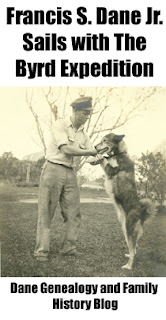Lexington Minute-man, October 11, 1933
Francis S. Dane Jr. Sails With the Byrd Expedition
Well Known Local Young Man Departs on the Jacob Rupert as One of the Dog Drivers. Dane Spent the Summer at the Chinook Kennels at Wonolancet, N. H.
Francis S. Dane Jr., son of Mr. and Mrs. Francis S. Dane of 1 Bennington road, sailed Wednesday, October 11, on the Jacob Rupert, which left Boston Navy Yard for the first lap of its journey to the South Pole with the supplies and dogs for the second Byrd Antarctic Expedition. Whether “Duke” Dane as he is popularly known, will go all the way to the South Pole is as yet uncertain, but he will go with the expedition at least through the Panama Canal, and probably to the “jumping-off-place” which at present appears to be Valporaiso, South America.
Since the middle of July Mr. Dane has been at the Chenook Kennels, in Wonolancet, N.H. assisting in the care and training of the huskie dogs for the expedition. During a considerable part of August and September he was unofficial charge-d’affairs where Byrd’s dogs were concerned, in the absence of Norman Vaughan and Allen Taylor who have successively been responsible for this division of the expeditionary forces.
The work at Wonolancet included the exercise and care of 150 dogs each of whom has to be given a run at least once each day besides being fed and supplied with water, the latter becoming one of the great problems owing to the continued drought in that section of New England. With but four regular men on duty the dog drivers were kept busy often 12 to 13 hours a day. Beside the work at the kennels trips had to be made to Canada to secure more dogs from time to time, as only those really fit can be taken on the expedition. This meant driving hugh trucks to Canada, loading them with crated dogs, and making the return trip, the latter usually without stopping for sleep as the howling of the dogs is not welcomed in most towns and villages. Mr. Dane made several such trips during the summer.
Last Friday night the dogs were brought to Boston on trucks a journey which took from 10 p.m. to 5 a.m. and on Saturday they were put onto the dock at the Navy Yard, where several local people visited them over the week-end. The crates were places in double rows on top of each other and once each day every dog was removed from the crate and given a chance to move about the deck at the end of a chain while his box was being cleaned. The dog-drivers of the expedition, including Mr. Dane were in charge of this work.
On Monday each dog had to be taken from the crate, run up the gang plank and held on deck while the crates were being loaded over the side of the Ruppert by the crew. Until the ship leaves Norfolk sometime next week the dogs must remain in their cages which are just large enough for them to turn around in. They are oblong boxes, made of stout wood reinforced by three bands of metal and having a front door of stout iron and wire mesh secured with a metal latch. When the ship leaves Norfolk the dogs will be taken from the crates and chained to the deck where they will have somewhat more freedom.
On the trip through the tropics the dogs lie on the ship and pant; they do not want food, or even much water. Some will not survive the trip, especially if the hot weather lasts over an extended period. This is one of the reasons for taking so large a number as 153 which are at present on board.
The duties of a dog-driver on such as expedition as this planned by Admiral Richard E. Byrd are anything but a pleasant game. It is the hardest type of physical labor, under often unbelievably trying conditions, but if one is not afraid of the work, likes the sea, and has a real love for and understanding of dogs it is one of the greatest adventures and opportunities which can come to a young man. “Duke” Dane has the qualities which will make for success and has more over no illusions about the hardships into which he is going. Not only has he worked with this particular Expedition all summer, he has also been with one of the North Polar Expeditions of Captain Donald B. MacMillan as far as the ice, and knows what to expect on a sea voyage. Although somewhat tired from the lack of sleep during the past weeks, he is in excellent physical shape and is in everyway prepared for the great adventure. His many friends wish him Bon Voyage and a safe return.

